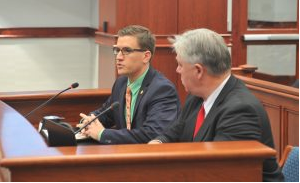A shortage of qualified substitute teachers in Michigan schools has evidently forced some students to rely on the internet to teach themselves.
According to Bridge Michigan, a think tank and publisher, the state granted 2,500 permits for long-term substitute teachers during the 2018-19 academic year. Some of these instructors may or may not have been qualified to teach the subjects they were assigned.
One student cited in the report said that he relied on YouTube videos to fill in the gaps in chemistry class at charter school Universal Academy in Detroit. This class was helmed by a substitute.

Michigan state Rep. Aaron Miller (R-Sturgis), testifies before the Senate Education Committee.
| http://gophouse.org/
State Rep. Aaron Miller (R-Sturgis) said in an interview that the teacher shortage is part of larger issues affecting the state.
“I think the cause for looking for unlicensed subs comes down to a shortage of workers that, frankly, affects just about every industry in Michigan right now,” Miller told the Sturgis-Coldwater News via email. “My opinion is that the pool of people previously willing to work as a substitute teacher is much smaller because of that problem.”
Rodney D. Chupp, GOP chair for St. Joseph County, blamed the 2008 recession and lagging recovery for the shortage.
“Many people don't fully appreciate that at one point, 20 percent or one out of every five jobs lost nationally, were lost in Michigan alone,” Chupp told Sturgis-Coldwater News, also via email. “We lost a lot of candidates to fill some of these positions to other states that were more friendly toward business. It's tough bouncing back from that.”
The ongoing teacher shortage has prompted some districts to raise compensation for substitutes to, in some cases, more than $100 per day. State law only requires 90 college credit hours to become a qualified substitute teacher, though, as the Detroit Free Press noted, teaching certificates are demanded by some.
But should statewide legislation be drafted to increase compensation? Miller said it should remain a community issue.
“While substitute teachers could always be paid more, that’s a local decision and moreover costs money,” Miller said. “I think that economic times and worker shortages are the most significant reasons, combined with the fact that it’s no easy job.”
Chupp cited anecdotal evidence supporting the claim that the job is not easy.
“Money alone doesn’t fix most things,” Chupp said. “I have had several individuals that used to work as substitute teachers tell me they simply will no longer do so, due to the blatant disrespect they were subjected to.”
Chupp added that a “gifted” teacher he knows opted for early retirement to escape “disrespect and abuse from both students and the students' parents.”
Neither source interviewed for this article said that educational requirements should be lowered to entice more workers.
“These individuals spend time with students, after all,” Miller said. “I’m definitely not in favor of getting rid of college credit requirements for subs.”
Chupp, who attended public schools and served three terms on his local school board, said listening to former subs is a first step to fix the issue.
“Competitive compensation and the ability to purchase benefits would certainly have to help,” he said. “A school with a culture of respect and civil treatment would help, too.”


 Alerts Sign-up
Alerts Sign-up